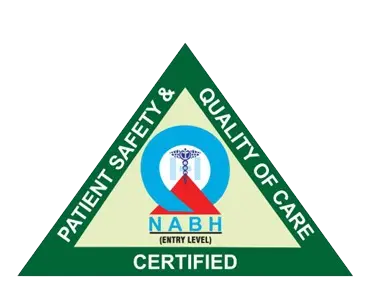Borderline Personality Disorder (BPD) involves intense mood swings, impulsive behavior, and a distorted sense of self. People with BPD often struggle with unstable relationships, fear of abandonment, emotional outbursts, and chronic feelings of emptiness.
“She’s just being dramatic,” “He’s too emotional,” and “They can’t control themselves.” These claims are made flippantly, but they disclose an incredible ignorance of a grave mental health issue: Borderline Personality Disorder (BPD). To those who suffer with BPD, every emotion is multiplied, every relationship appears to be on the verge of rupture, and life can become a warp-speed traverse of an emotional tightrope.
At Criticare Hospital, they are determined to shine some light on such issues, such as BPD, for that matter, to make people realize that it is not a matter of weakness but a real emotional disease needing real medical attention. Let’s discover what BPD is, what effects it has on lives, and how to overcome it if you get the proper support.
What is borderline personality disorder?
BPD is an identity disorder, with emotional instability being the main thing that causes the problem. There is exceptionally high mood instability, volatility in interpersonal relationships, impulsive actions, and a generally poor self-image. Personality disorders of Cluster B have to do with one’s perception of self and others.
More than mood swings, it is an ever-present inner storm that makes day-to-day life impossible to live. People with BPD are people who have strong feelings that last for longer periods, and they cannot control their feelings either, which can be the cause of conflict and instability, which leads to self-destructive behaviour. BPD is a disorder of emotion regulation, identity, and connection.
Key Symptoms of BPD
People with BPD show a variety of symptoms; they can be different for different people. Nevertheless, the DSM-5 refers to nine criteria for diagnosis. If one suffers from at least five of these, they may be declared BPD.
The symptoms involve a desperate fear of abandonment, leading to desperate efforts to avoid real or imagined separations. Their associations are quite inconsistent; they can idealize someone at one point and devalue them in the next. Their sense of self-identity can also totally change when it comes to confusion about goals, values, and purpose.
Many who do impulsive actions-such as drug taking, wild spending, or overeating-become self-mutilating or suicidal when at a loss. Emotional instability is a proper mark of BPD, and this results in poor moods and consistent emptiness with uncontrollable anger. In extreme cases, one can develop paranoid thinking or dissociation in times of stress.
What Causes BPD?
- Genetics
Studies indicate that BPD may be hereditary and thus a genetic factor. People having a first-degree relative who has BPD are at higher risk of developing the disease. Nevertheless, genetics do not play a role in deciding one’s fate, as the environment also has a major role to play.
- Brain Structure and Function
Research using brain images has indicated that parts of the brain that control emotion, impulse control, and aggression (amygdala, hippocampus, and prefrontal cortex) show abnormalities. Such differences may help explain why people with BPD have trouble controlling their reactions and with emotional regulation.
- Environmental Factors
This, in turn, is a strong predisposition to developing BPD, particularly if that trauma occurred during childhood. The abuse, neglect, or chronic instability have been reported by many people to have occurred during their early life as children. Not all cases, however, are trauma-based. Childhood chronic invalidation, where emotional needs are repulsed or reviled, is another potential cause of BPD. The pathology usually happens in adolescence or very early adulthood, and emotional development is still occurring.
Living with BPD: What Does It Feel Like?
Life every day feels like a battle of emotions for a person who has BPD. Even a slight comment may produce feelings of deepest shame or rejection. An insignificant disagreement may lead to none or over-the-top panic or rage. They can end up in relationships that are overwhelmingly loving one day and bone-crushingly toxic the next.
Within itself, there’s often a continual fight between longing for connection and fear of abandonment. They can be very emotionally sensitive, hence very empathetic and intuitive, but also overly reactive. Those suffering from BPD will frequently describe a feeling that they do not have a consistent sense of self, asking themselves who they are or what they believe in, moment to moment. It is tiring to live with BPD, not only for the sufferer but also for the people they love. But with knowledge and the right therapy, most of these emotional storms can be reduced.
How is BPD diagnosed?
The diagnosis of BPD requires a full psychiatric workup. Usually, psychiatrists or psychologists will have long, detailed interviews, including history-taking about the patient and family, checks for co-morbid entities such as depression or anxiety, while being approachable for PTSD, and so on.
There must be a diagnosis because BPD mimics symptoms of other conditions, such as bipolar disorder or complex trauma. At Criticare Hospital, our mental health professionals are trained to work with rigid diagnostic tools and allow room for a broad and empathic view that can fairly represent the patient and allow for proper diagnosis.
Treatment Options for BPD
- Therapies
DBT teaches individuals to resist distress, form good relationships, and practice decreasing self-harm. There is an attempt by CBT to allow people to identify distorted thoughts that cause painful emotions and dysfunctional behaviours, with a special emphasis on anxious and depressive thoughts associated with BPD. Whereas, MBT helps persons identify their own thoughts and feelings as well as those of other people. Such knowledge may help restructure human relationship dynamics and reduce impulsivity.
- Medical Treatments
There isn’t any medicine that treats BPD, but some medicines can treat certain symptoms. Some may take antidepressants for mood instability and depressive symptoms. Other drugs, such as mood stabilizers, can mellow down emotions and impulsiveness, while antipsychotics may be given sometimes to treat paranoia or dissociation.
- Hospitalization
If there is a severe emotional crisis, hospitalization is possible; in particular, suicide or self-harm may be the case. At Criticare Hospital, we offer a secure and compassionate inpatient environment where patients are stabilized and incorporated under intensive therapies and transferred to continuing outpatient care. It is not merely crisis management that drives the goal, but rather long-term recovery and resilience.
Support for Families and Beloved.
BPD can cause emotional turmoil, not only for the person suffering from it but also for the family members, friends, and caregivers. There is a trend for misunderstandings, fatigue, or even helplessness among the patient’s closest ones. Such an unfortunate situation dictates the importance of family intervention in any good treatment. Through education and family therapy, coping strategies can be learned, the need for empathy can be developed, and healthier communication patterns can be established.
Support groups, however, provide another outlet where families can share experiences and get guidance. Criticare Hospital has structured family support programs for loved ones, which increase the chance of understanding BPD better and learning how best to support the process of recovery while maintaining their well-being.
Hope and Healing: A Real Possibility
Despite being serious and complicated, BPD is easy to treat. Many with BPD do well in therapy, and life out in the world becomes stable and fulfilling. Recovery also does not mean the disappearance of all symptoms. Being able to regulate one’s emotions, form interpersonal connections, and purposefully live comprises all aspects of life. Healing truly is possible, but it does demand commitment and consistency, as well as outside support. And we at Criticare Hospital cheer and celebrate at every step, however little. We are a progressive place; we value progress and not perfection, and the transformative power of compassionate care.
Conclusion:
Borderline Personality Disorder is not an idiosyncrasy. It is an agonizingly disruptive mental disorder requiring gentle healing through loving compassion. Criticare Hospital provides a safe harbour where a person with BPD may seek help without being judged. We can fight the stigma of conception together to create a world in which everyone has the opportunity to heal and develop.




